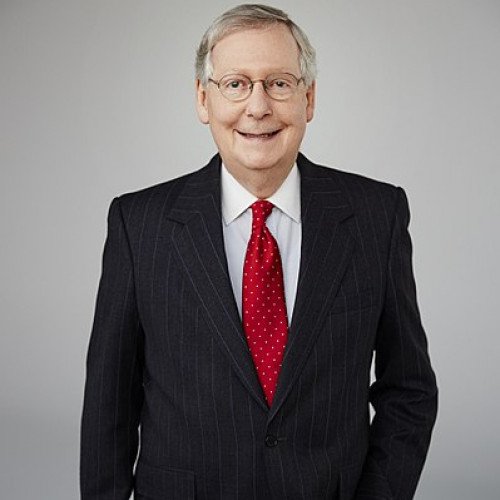Mitch McConnell VS Barry Goldwater

Mitch McConnell
Addison Mitchell McConnell Jr. (born February 20, 1942) is an American politician serving as the Senate Minority Leader since January 20, 2021. A Republican, McConnell is currently serving as the senior United States senator from Kentucky, first elected in 1984. McConnell is the second Kentuckian to serve as a party leader in the Senate, the longest-serving U.S. senator for Kentucky in history, and the longest-serving leader of U.S. Senate Republicans in history. McConnell was first elected to the Senate in 1984. During the 1998 and 2000 election cycles, he was chairman of the National Republican Senatorial Committee. McConnell was elected as Majority Whip in the 108th Congress and was re-elected to the post in 2004. In November 2006, he was elected Senate minority leader; he held that post until 2015, when Republicans took control of the Senate and he became Senate majority leader. McConnell holds conservative political positions, although he was known as a pragmatist and a moderate Republican early in his political career. He led opposition to stricter campaign finance laws, culminating in the Supreme Court ruling Citizens United v. FEC that partially overturned the Bipartisan Campaign Reform Act (McCain-Feingold) in 2010. McConnell worked to withhold Republican support for major presidential initiatives during the Obama administration, having made frequent use of the filibuster, and blocked many of President Barack Obama's judicial nominees, including Supreme Court nominee Merrick Garland. During the Trump administration, Senate Republicans, under McConnell's leadership, broke a record for largest number of federal appeals court judges confirmed during a president's first two years; among those nominees were Neil Gorsuch, Brett Kavanaugh, and Amy Coney Barrett, all of whom were confirmed to the Supreme Court. After the 2020 United States Senate elections, McConnell returned to the position of minority leader, as the 50–50 tie in the Senate can be broken by Vice President Kamala Harris. In January 2021, McConnell indicated that he believes the second impeachment of former President Trump is justified due to his role in inciting the 2021 storming of the United States Capitol.
Statistics for this Xoptio

Barry Goldwater
Barry Morris Goldwater (January 2, 1909 – May 29, 1998) was an American politician, businessman, and author who was a five-term Senator from Arizona (1953–1965, 1969–1987) and the Republican Party nominee for president of the United States in 1964. Despite his loss of the 1964 presidential election in a landslide, Goldwater is the politician most often credited with having sparked the resurgence of the American conservative political movement in the 1960s. He also had a substantial impact on the libertarian movement.Goldwater rejected the legacy of the New Deal and, along with the conservative coalition, fought against the New Deal coalition. A member of the NAACP and active supporter of desegregation in Phoenix, Goldwater voted in favor of the Civil Rights Act of 1957 and the 24th Amendment to the U.S. Constitution, but opposed the Civil Rights Act of 1964, believing it to be an overreach by the federal government—a decision that considerably anguished him. In 1964, Goldwater mobilized a large conservative constituency to win the hard-fought Republican presidential primaries. Although raised as an Episcopalian, Goldwater was the first candidate of ethnically Jewish heritage to be nominated for President by a major American party (his father was Jewish). Goldwater's platform ultimately failed to gain the support of the electorate and he lost the 1964 presidential election to incumbent Democrat Lyndon B. Johnson by one of the largest margins in history. Goldwater returned to the Senate in 1969 and specialized in defense and foreign policy. As an elder statesman of the party, Goldwater successfully urged President Richard Nixon to resign in 1974 when evidence of a cover-up in the Watergate scandal became overwhelming and impeachment was imminent. Goldwater narrowly won re-election in 1980 for what would be his final and most influential term in the senate. In 1986, Goldwater oversaw passage of the Goldwater–Nichols Act, arguably his most significant legislative achievement, which strengthened civilian authority in the Department of Defense. The following year, he retired from the Senate and was succeeded by John McCain, who praised his predecessor as the man who "transformed the Republican Party from an Eastern elitist organization to the breeding ground for the election of Ronald Reagan". Goldwater strongly supported the 1980 presidential campaign of Reagan, who had become the standard-bearer of the conservative movement after his "A Time for Choosing" speech. Reagan reflected many of the principles of Goldwater's earlier run in his campaign. The Washington Post columnist George Will took note of this, writing: "We [...] who voted for him in 1964 believe he won, it just took 16 years to count the votes". Goldwater's views grew increasingly libertarian as he neared the end of his career. After leaving the Senate, Goldwater's views cemented as libertarian. He criticized the "moneymaking ventures by fellows like Pat Robertson and others [in the Republican Party] who are trying to... make a religious organization out of it." He lobbied for homosexuals to be able to serve openly in the military, opposed the Clinton administration's plan for health care reform, supported abortion rights, and the legalization of medicinal marijuana.